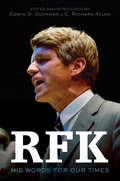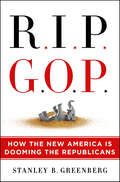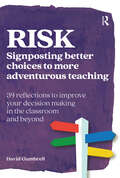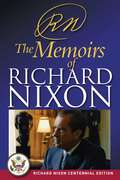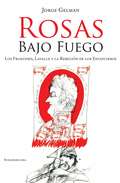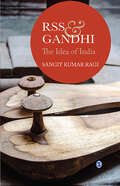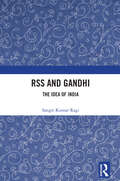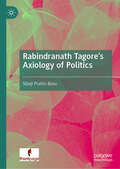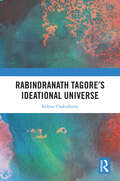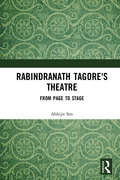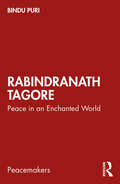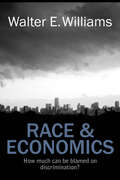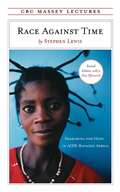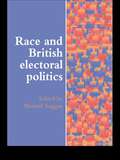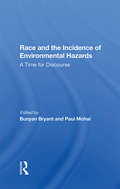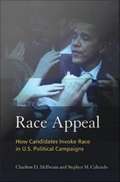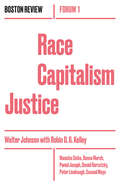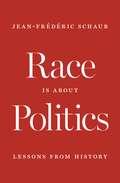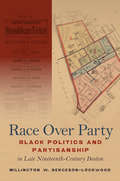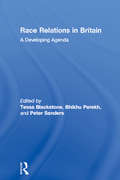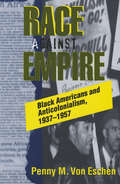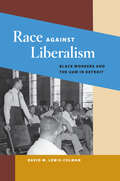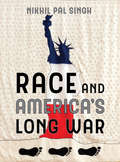- Table View
- List View
RFK: His Words for Our Times
by Robert F. Kennedy Jr.An inspiring collection of Robert Francis Kennedy’s most famous speeches accompanied by commentary from notable historians and public figures.Twenty-five years after Bobby Kennedy was assassinated, RFK: His Words for Our Times, a celebration of Kennedy’s life and legacy, was published to enormous acclaim. Now this classic volume has been thoroughly edited and updated. Through his own words we get a direct and intimate perspective on Kennedy’s views on civil rights, social justice, the war in Vietnam, foreign policy, the desirability of peace, the need to eliminate poverty, and the role of hope in American politics.Here, too, is evidence of the impact of those he knew and worked with, including his brother John F. Kennedy, Lyndon Johnson, Martin Luther King, Jr., and Cesar Chavez, among others. The tightly curated collection also includes commentary about RFK’s legacy from major historians and public figures, among them Barack Obama, Bill Clinton, Eric Garcetti, William Manchester, Elie Wiesel, and Desmond Tutu. Assembled with the full cooperation of the Kennedy family, RFK: His Words for Our Times is a potent reminder of Robert Kennedy’s ability to imagine a greater America—a faith and vision we could use today.“Themes include civil rights, mistrust of large government, citizen participation in local government, eliminating poverty, and ending the Vietnam War. The speeches demonstrate Kennedy’s skill at connecting with large, enthusiastic audiences with promises of hope and equality.” —Library Journal“A blueprint for the future.” —Vital Speeches
RIP GOP: How the New America Is Dooming the Republicans
by Stanley B. GreenbergA leading pollster and adviser to America’s most important political figures explains why the Republicans will crash in 2020. For decades the GOP has seen itself in an uncompromising struggle against a New America that is increasingly secular, racially diverse, and fueled by immigration. It has fought non-traditional family structures, ripped huge holes in the social safety net, tried to stop women from being independent, and pitted aging rural Evangelicals against the younger, more dynamic cities.Since the 2010 election put the Tea Party in control of the GOP, the party has condemned America to years of fury, polarization and broken government. The election of Donald Trump enabled the Republicans to make things even worse. All seemed lost.But the Republicans have set themselves up for a shattering defeat.In RIP GOP, Stanley Greenberg argues that the 2016 election hurried the party’s imminent demise. Using amazing insights from his focus groups with real people and surprising revelations from his own polls, Greenberg shows why the GOP is losing its defining battle. He explores why the 2018 election, when the New America fought back, was no fluke. And he predicts that in 2020 the party of Lincoln will be left to the survivors, opening America up to a new era of renewal and progress.
RISK: Signposting better choices to more adventurous teaching (Practical Teaching)
by David Gumbrell39 reflections to improve your decision making in the classroom and beyond.Go on! You can do it!Are teachers becoming ever more compliant as a profession? By just quietly getting on with things there is a danger of losing that spark that attracted you to your career in the first place. However, if you feel empowered to take more risks - to take back control of how you teach - then you have the chance to reignite your passion for the job.This book follows on from David Gumbrell’s text LIFT!, arguing that when you are feeling more resilient you have the courage and confidence to take more risks. You can also calculate that risk more rationally, thereby making it less risky and more likely to result in success. As this cycle continues you become more invigorated, more inspired and thus more engaging as a teacher.A beautifully written book with David's characteristic use of rich metaphors and thoughtful narrative. This book will certainly help you make bolder and better decisions in the classroom and beyond. Adrian Bethune.
RN: The Memoirs of Richard Nixon
by Richard Nixon“Informative, explicit, even suspense-ridden.…An important source for students of the Nixon presidency.” —The New York TimesFormer President Richard Nixon's bestselling autobiography is an intensely personal examination of his life, public career, and White House years. With startling candor, Nixon reveals his beliefs, doubts, and behind-the-scenes decisions, shedding new light on his landmark diplomatic and domestic initiatives, political campaigns, and historic decision to resign from the presidency. Memoirs, spanning Nixon’s formative years through his presidency, reveals the personal side of Richard Nixon. Witness his youth, college years, and wartime experiences, events which would shape his outward philosophies and eventually his presidency—and shape our lives. Follow his meteoric rise to national prominence and the great peaks and depths of his presidency. Throughout his career Richard Nixon made extensive notes about his ideas, conversations, activities, meetings. During his presidency, from November 1971 until April 1973 and again in June and July 1974, he kept an almost daily diary of reflections, analyses, and perceptions. These notes and diary dictations, quoted throughout this book, provide a unique insight into the complexities of the modern presidency and the great issues of American policy and politics.
ROSAS BAJO FUEGO (EBOOK)
by Jorge Daniel GelmanJuan Manuel de Rosas ocupa un lugar central en la historia argentina. Tanto por su papel fundamental en la construcción de un nuevo orden político luego de la revolución de independencia, como por el hecho de que ese mismo orden fuera utilizado a modo de ejemplo, positivo o negativo, para la lucha política hasta el presente. Rosas fue acusado de tirano, asesino, caudillo populista, representante de los intereses de los grandes estancieros o, al revés, reivindicado como defensor de los intereses nacionales y del pueblo. Su polémico protagonismo en las disputas del presente dificultó el estudio más a fondo de su gobierno y el análisis de los medios que utilizó para lograr la instauración de un nuevo orden, tras el fracaso de todos los intentos hechos desde 1810. Este libro se propone desentrañar los mecanismos y las herramientas que fueron claves en la construcción de su poder. Para ello analiza en detalle una coyuntura apasionante, que lo colocó al borde del abismo, acosado simultáneamente por un ataque naval francés que se extendió entre 1838 y 1840, el levantamiento rural de #los Libres del Sur# y una invasión del territorio de Buenos Aires encabezada por su rival unitario Juan Lavalle. El análisis de esta etapa en la que todo parecía posible permite observar cómo se pone en acción un conjunto muy amplio de estructururas y de actores, de un lado y del otro, y a la vez entender cómo logró Rosas vencer a esos enemigos tan poderosos. Siguiendo de cerca este proceso podremos observar también cómo la propia dinámica del enfrentamiento transforma el régimen de Rosas, a la vez que permite imponer la autoridad del Estado sobre otras bases.
RSS and Gandhi: The Idea of India
by Sangit Kumar RagiRSS and Gandhi: The Idea of India analyses the ideas of Gandhi and the RSS to understand how and where they converge on and diverge from each other in key questions that India continues to debate even today. The discourse on Gandhi and the RSS encompasses a fascinating debate in social, civilizational, cultural, political and religious questions which affianced the Indian minds towards nation building, both before and after independence. This book also examines their positions on issues and themes, where they may seem standing on the same page but reflect a tangential dispersion regarding means and methods. It discounts and dispels the predominant view that Gandhi and the RSS are diametrically opposed in their ideas on India and the Indian nation.
RSS and Gandhi: The Idea of India
by Sangit Kumar RagiThis book explores the relationship between Mohandas Karamchand Gandhi and the Rashtriya Swayamsevak Sangh (RSS) and discusses their relevance in India’s history and socio-political discourse. It looks back at the Indian independence movement and the key debates and issues that the country was confronted with in the early 1900s that continue to be relevant today. These include the practice of untouchability, tensions and conflicts between communities, the treatment of minorities and the marginalized, debates on the ideology of Hindutva, religious conversion, questions on the cultural and civilizational identity of India, and responses to Western modernity. This book discusses the ideological differences between Gandhi and the RSS while also focusing on areas where they converged. This book will be of interest to students, researchers, and academics working in the areas of modern Indian history, political science and philosophy. It will also be interesting to general readers curious about Gandhi and the RSS.
Rabbi Meir of Rothenburg and the Foundation of Jewish Political Thought
by Joseph Isaac LifshitzThis book is a scholarly examination of the political thought of Rabbi Meir (Maharam) of Rothenburg, the most important thirteenth century German Rabbi who was associated with the Pietist movement of the period. From the Maharam's responsa on community matters, a coherent political thought emerges that exercised nearly unprecedented influence on European Jewish communities up to the Jewish Emancipation. Rabbi Meir's extremely sophisticated attempt to balance the demands of the community against those of the individual was facilitated by a characteristic three-tiered structure to his political thought: concrete legal rules supported by value-laden legal principles built upon his general religious ideology. Through a systematic analysis of the Maharam's political thought, Isaac Lifshitz offers an original contribution to Jewish studies, political theory, and the study of legal philosophy. By considering the legal and theological underpinnings of one of Medieval Jewry's most influential figures, it also makes a contribution to the history of ideas in the Medieval period.
Rabindranath Tagore's Axiology of Politics
by Sibaji Pratim BasuThis book revisits Rabindranath Tagore’s opinion and standpoints on constituent elements of politics from the stance of this marker––axiology, so that many well-known aspects of his thought may be seen in a different light. Among the Indian luminaries of the first half of the twentieth century, who were well-known both in the East and the West, Rabindranath Tagore (1861–1941) was arguably the most ‘gifted’ personality. Besides being the first non-European recipient of the Nobel Prize for Literature (1913) and the ‘ambassador’ of Indian culture to the West, he also wrote voluminous essays and letters on socio-political issues––engaged himself in various protests against the raj, as a pacifist in international arena and also as a polemical writer. Tagore is often described as the ‘conscience’ of the Indian nation. This book includes a long Tagore-Einstein conversation and a longish dialogue with H G Wells and his creative writings––poems, fictions, plays, and ‘personal’ letters––along with his direct political discourses to understand his Political Thought in a more comprehensive way.
Rabindranath Tagore's Ideational Universe
by Bidyut ChakrabartyThis book explores Tagore’s socio-political ideas through his novels, short stories, and essays. It looks at Tagore beyond his literary achievements and examines his notions of friendship, religion, nationalism, civilization, and knowledge. It highlights his uniquely textured and innovatively argued views on critical aspects of humanity in the tumultuous phase of Indian nationalist campaign that also witnessed a kaleidoscope of myriad ideological voices, besides the hegemonic mainstream nationalist campaign, led by Gandhi. It captures the bard’s creative ideational priorities and his attempts to radically transform the prevalent socio-economic and politico-cultural environment. The volume will be of great interest to scholars and researchers of history, politics, literature, and South Asian studies.
Rabindranath Tagore's Theatre: From Page to Stage
by Abhijit SenThis book analyses Rabindranath Tagore’s contribution to Bengali drama and theatre. Throughout this book, Abhijit Sen locates and studies Rabindranath’s experiments with drama/theatre in the context of the theatre available in nineteenth-century Bengal, and explores the innovative strategies he adopted to promote his ‘brand’ of theatre. This approach finds validation in the fact that Rabindranath combined in himself the roles of author-actor-producer, who always felt that, without performance, his dramatic compositions fell short of the desired completeness. Various facets of his plays as theatre and his own role as a theatre-practitioner are the prime focus of this book. This book will be of great interest to students and scholars in Theatre and Performance Studies and most notably, those focusing on Indian Theatre and Postcolonial Theatre.
Rabindranath Tagore: Peace in an Enchanted World (Peacemakers)
by Bindu PuriThis book explores Rabindranath Tagore’s distinctive argument for peace—in spiritual rather than in political—terms. Drawing on seminal texts by Tagore, the book presents the reader with a comprehensive overview of Gurudev’s seemingly contradictory notions of individual freedom, universal love for humanity and faith in the great Eastern nation. It underlines Tagore’s argument that peace could be best affected not by a league of nations but in educational institutions and that the “Religion of Man” lay in the truth of inter-relationships between human beings.A concise handy guide to Tagore’s philosophy, this book will be essential for students and scholars of philosophy, Tagore studies, peace and conflict studies and South Asian studies.
Rac(e)ing to Class: Confronting Poverty and Race in Schools and Classrooms
by H. Richard Milner IVIn this incisive and practical book, H. Richard Milner IV provides educators with a crucial understanding of how to teach students of color who live in poverty. Milner looks carefully at the circumstances of these students&’ lives and describes how those circumstances profoundly affect their experiences within schools and classrooms. In a series of detailed chapters, Milner proposes effective practices—at district and school levels, and in individual classrooms—for school leaders and teachers who are committed to creating the best educational opportunities for these students. Building on established literature, new research, and a number of revelatory case studies, Milner casts essential light on the experiences of students and their families living in poverty, while pointing to educational strategies that are shaped with these students' unique circumstances in mind. Milner&’s astute and nuanced account will fundamentally change how school leaders and teachers think about race and poverty—and how they can best serve these students in their schools and classrooms.
Race & Economics: How Much Can Be Blamed on Discrimination?
by Walter E. WilliamsWalter E. Williams applies an economic analysis to the problems black Americans have faced in the past and still face in the present to show that that free-market resource allocation, as opposed to political allocation, is in the best interests of minorities. He debunks many common labor market myths and reveals how excessive government regulation and the minimum-wage law have imposed incalculable harm on the most disadvantaged members of our society.
Race Against Time: Searching for Hope in AIDS-Ravaged Africa (The CBC Massey Lectures)
by Stephen Lewis"I have spent the last four years watching people die." With these wrenching words, diplomat and humanitarian Stephen Lewis opens his 2005 CBC Massey Lectures. Lewis's determination to bear witness to the desperate plight of so many in Africa and elsewhere is balanced by his unique, personal, and often searing insider's perspective on our ongoing failure to help. Lewis recounts how, in 2000, the United Nations Millennium Summit in New York introduced eight Millennium Development Goals, which focused on fundamental issues such as education, health, and cutting poverty in half by 2015. In audacious prose, alive with anecdotes ranging from maddening to hilarious to heartbreaking, Lewis shows why and how the international community is falling desperately short of these goals. This edition includes an afterword by Lewis, covering events after the lectures were delivered in fall 2005.
Race And British Electoral Politics
by Shamit SaggarThis text examines key themes pertaining to the study of race and electoral politics. Addressing an issue which is of immense topical interest, it offers comprehensive coverage of key topics. Providing both an historical and theoretical analysis of race and ethnicity in politics, the contributors examine the participation and influence of ethnic minorities in electoral politics at both ends of the political spectrum. "Race and British Electoral Politics" should be of value for students studying British politics, particularly those taking course options on electoral politics, race, ethnicity and comparative politics.
Race And The Incidence Of Environmental Hazards: A Time For Discourse
by Bunyan Bryant Paul MohaiThis book discusses the poor and people of color and their struggle to take control of one of the most basic aspects of their lives: the quality of their environment. It exposes the fact of environmental inequity and its consequences in face of general neglect by policymakers and social scientists.
Race Appeal: How Candidates Invoke Race in U.S. Political Campaigns
by Charlton D. Mcilwain Stephen M. CaliendoIn our evolving American political culture, whites and blacks continue to respond very differently to race-based messages and the candidates who use them. Race Appeal examines the use and influence such appeals have on voters in elections for federal office in which one candidate is a member of a minority group. Charlton McIlwain and Stephen Caliendo use various analysis methods to examine candidates who play the race card in political advertisements. They offer a compelling analysis of the construction of verbal and visual racial appeals and how the news media covers campaigns involving candidates of color. Combining rigorous analyses with in-depth case studies-including an examination of race-based appeals in the historic 2008 presidential election-Race Appeal is a groundbreaking work that represents the most extensive and thorough treatment of race-based appeals in American political campaigns to date.
Race Capitalism Justice (Boston Review / Forum #1)
by Robin D. G. Kelley Walter JohnsonRace Capitalism Justice urges us to embrace a vision of justice attentive to the history of slavery not through the lens of human rights, but instead through an honest accounting of how slavery was the foundation of capitalism, a legacy that continues to afflict people of color and the poor. Inspired by Cedric J. Robinson's work on racial capitalism, as well as Black Lives Matter and its forebears including the black radical tradition, the Black Panthers, South African anti-apartheid struggles, and organized labor, contributors to this volume offer a critical handbook to racial justice in the age of Trump.
Race Is about Politics: Lessons from History
by Jean-Frédéric SchaubHow the history of racism without visible differences between people challenges our understanding of the history of racial thinkingRacial divisions have returned to the forefront of politics in the United States and European societies, making it more important than ever to understand race and racism. But do we? In this original and provocative book, acclaimed historian Jean-Frédéric Schaub shows that we don't—and that we need to rethink the widespread assumption that racism is essentially a modern form of discrimination based on skin color and other visible differences. On the contrary, Schaub argues that to understand racism we must look at historical episodes of collective discrimination where there was no visible difference between people. Built around notions of identity and otherness, race is above all a political tool that must be understood in the context of its historical origins.Although scholars agree that races don't exist except as ideological constructions, they disagree about when these ideologies emerged. Drawing on historical research from the early modern period to today, Schaub makes the case that the key turning point in the political history of race in the West occurred not with the Atlantic slave trade and American slavery, as many historians have argued, but much earlier, in fifteenth-century Spain and Portugal, with the racialization of Christians of Jewish and Muslim origin. These Christians were discriminated against under the new idea that they had negative social and moral traits that were passed from generation to generation through blood, semen, or milk—an idea whose legacy has persisted through the age of empires to today.Challenging widespread definitions of race and offering a new chronology of racial thinking, Schaub shows why race must always be understood in the context of its political history.
Race Over Party: Black Politics and Partisanship in Late Nineteenth-Century Boston
by Millington W. Bergeson-LockwoodIn late nineteenth-century Boston, battles over black party loyalty were fights over the place of African Americans in the post–Civil War nation. In his fresh in-depth study of black partisanship and politics, Millington W. Bergeson-Lockwood demonstrates that party politics became the terrain upon which black Bostonians tested the promise of equality in America's democracy. Most African Americans remained loyal Republicans, but Race Over Party highlights the actions and aspirations of a cadre of those who argued that the GOP took black votes for granted and offered little meaningful reward for black support. These activists branded themselves "independents," forging new alliances and advocating support of whichever candidate would support black freedom regardless of party.By the end of the century, however, it became clear that partisan politics offered little hope for the protection of black rights and lives in the face of white supremacy and racial violence. Even so, Bergeson-Lockwood shows how black Bostonians' faith in self-reliance, political autonomy, and dedicated organizing inspired future generations of activists who would carry these legacies into the foundation of the twentieth-century civil rights movement.
Race Relations in Britain: A Developing Agenda
by Bhikhu Parekh Peter Sanders Tessa BlackstoneBringing together distinguished experts in the field of race relations this book addresses questions which are increasingly relevant in the current socio-political context of Great Britain. The kind of visions of multicultural Britain which are currently being canvassed and the problems which ethnic minorities continue to face are addressed, together with an examination of the new policy initiatives which are needed to tackle these problems. Race Relations in Britain falls into three parts which:* analyse contemporary trends, articulating a vision of multicultural Britain and exploring important theoretical controversies* identify the obstacles that stand in the way of a racism-free Britain, looking at current policy in areas such as immigration, employment, education, the criminal justice system as well as the role of the media* offer a vision of a multi-cultural Britain, advancing new policies based on current research.
Race against Empire: Black Americans and Anticolonialism, 1937–1957
by Penny M. Von EschenDuring World War II, African American activists, journalists, and intellectuals forcefully argued that independence movements in Africa and Asia were inextricably linkep to political, economic, and civil rights struggles in the United States. Marshaling evidence from a wide array of international sources, including the black presses of the time, Penny M. Von Eschen offers a vivid portrayal of the African diaspora in its international heyday, from the 1945 Manchester Pan-African Congress to early cooperation with the United Nations.Race against Empire tells the poignant story of a popular movement and its precipitate decline with the onset of the Cold War. Von Eschen documents the efforts of African-American political leaders, intellectuals, and journalists who forcefully promoted anti-colonial politics and critiqued U.S. foreign policy. The eclipse of anti-colonial politics--which Von Eschen traces through African-American responses to the early Cold War, U.S. government prosecution of black American anti-colonial activists, and State Department initiatives in Africa--marked a change in the very meaning of race and racism in America from historical and international issues to psychological and domestic ones. She concludes that the collision of anti-colonialism with Cold War liberalism illuminates conflicts central to the reshaping of America; the definition of political, economic, and civil rights; and the question of who, in America and across the globe, is to have access to these rights.Exploring the relationship between anticolonial politics, early civil rights activism, and nascent superpower rivalries, Race against Empire offers a fresh perspective both on the emergence of the United States as the dominant global power and on the profound implications of that development for American society.
Race against Liberalism: Black Workers and the UAW in Detroit (Working Class in American History)
by David M. Lewis-ColmanRace against Liberalism examines how black worker activism in Detroit shaped the racial politics of the labor movement and the white working class. David M. Lewis-Colman traces the substantive, long-standing disagreements between liberals and the black workers who embraced autonomous race-based action. As he shows, black autoworkers placed themselves at the center of Detroit's working-class politics and sought to forge a kind of working class unity that accommodated their interests as African Americans. The book covers the independent caucuses in the 1940s and the Trade Union Leadership Council in the 1950s; the black power movement and Revolutionary Union Movements of the mid-1960s; and the independent race-based activism of the 1970s that resulted in Coleman Young's 1973 election as the city's first black mayor.
Race and America's Long War
by Nikhil Pal SinghDonald Trump’s election to the U.S. presidency in 2016, which placed control of the government in the hands of the most racially homogenous, far-right political party in the Western world, produced shock and disbelief for liberals, progressives, and leftists globally. Yet most of the immediate analysis neglects longer-term accounting of how the United States arrived here. Race and America’s Long War examines the relationship between war, politics, police power, and the changing contours of race and racism in the contemporary United States. Nikhil Pal Singh argues that the United States’ pursuit of war since the September 11 terrorist attacks has reanimated a longer history of imperial statecraft that segregated and eliminated enemies both within and overseas. America’s territorial expansion and Indian removals, settler in-migration and nativist restriction, and African slavery and its afterlives were formative social and political processes that drove the rise of the United States as a capitalist world power long before the onset of globalization. Spanning the course of U.S. history, these crucial essays show how the return of racism and war as seemingly permanent features of American public and political life is at the heart of our present crisis and collective disorientation.
